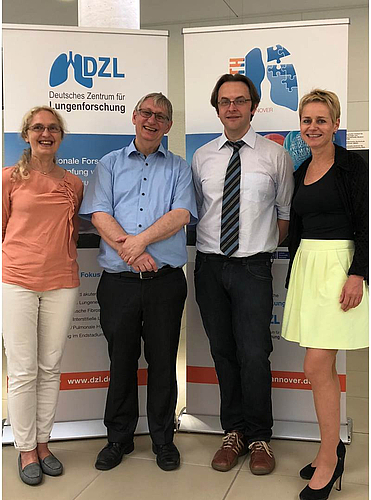In addition to the widespread lung diseases such as COPD and asthma, BREATH, the Hanoverian site of the German Center for Lung Research, also investigates comparatively rare lung diseases. Among others this includes the so-called alpha-1-antitrypsin deficiency. In this disease, a gene change, the protective enzyme alpha-1-antitrypsin (AAT) is less or not formed. The absence of this enzyme leads to progressive damage to the lung tissue.
The similarity of symptoms with COPD or asthma can easily lead to a misdiagnosis. However, as additional treatment options are available for the AAT deficiency, it is particularly important to sensitize physicians and patients to this rare condition.
For this purpose, on 02.06.2018 the first patient seminar on Alpha-1-Antitrypsin deficiency took place at the Hannover Medical School (MHH). The lecturers of the Department of Pulmonology, all of them scientists at BREATH, informed the patients and their relatives present about the current state of research. In addition, there was the opportunity to exchange with the experts.
After the welcome by the 1st chairman of the self-help organization Alpha1 Germany, Marion Wilkens, Prof. Dr. Tobias Welte, Head of the Department of Pulmonology at MHH and site manager at BREATH, examined the mechanisms of the disease and its therapy and emphasized the special relevance of immunization vaccination in AAT patients. Subsequently, Dr. Mark Greer, senior physician of pulmonology and specialist in the field of lung transplantation, on the experiences and peculiarities of lung transplants in AAT patients. Prof. Janciauskiene, head of Molecular Pulmonology, presented current research approaches to therapy.
Although an AAT deficiency usually affects the lungs, liver damage may also occur with age. Dr. Pavel Strnad, head of the Alpha1 Liver Center, who arrived for his presentation from Aachen, informed the participants about how alpha1-antitrypsin, lung and liver are related. Mrs. Gabi Niethammer, 2nd chairperson of Alpha1 Germany, closed the event with her talk on how to handle this hereditary disease with and for children as well as for family planning.
The feedback was consistently positive so that the patient seminar will be held again in the future.
The event took place in collaboration with the Lungeninformationsdienst and the self-help organization Alpha1 Germany and was kindly supported financially by the companies CSL Behring, GRIFOLS, Chiesi and Linde.
Text: BREATH / CD
Picture: BREATH / CD

The speakers and organizers of the 1st patient seminar Alpha1-antitrypsin deficiency of the Department of Pulmonology/ BREATH; f.l.t.r.: Prof. Dr. Sabina Janciauskiene. Prof. Dr. Tobias Welte, Dr. Mark Greer, Dr. Annegret Zurawski
![[Translate to English:] [Translate to English:]](/fileadmin/_processed_/7/9/csm_Patientenseminar_AAT_Impressionen_2ffdab71d6.jpg)
[Translate to English:] Eindrücke vom 1. Patientenseminar AAT an der Medizinischen Hochschule Hannover
![[Translate to English:] [Translate to English:]](/fileadmin/_processed_/8/6/csm_Logos_Patiententag_AAT_Seminar_55c7d02479.jpg)
[Translate to English:]